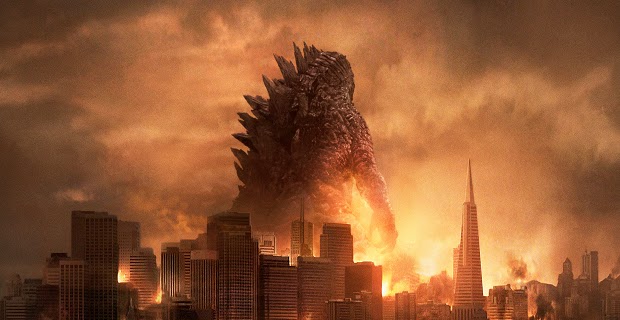Kaiju badassery.
If last year’s “Pacific Rim” has
offered more than a passing hint of kaiju nostalgia, then this year’s
“Godzilla”, Gareth Evans’ modern and westernized take on the monstrous pop
culture icon, gives out more than just a splotch of it. And if Roland
Emmerich’s 1998 dud of a remake is more about shitting on the entirety of the monster’s
mythology and, as much as possible, distancing itself away from its Japanese
origins, this one right here, from the title card itself up to the way the
music hits certain notes at key moments, is a faithful tribute through and
through, if not a bit imbalanced. It boasts of high-end special effects that
even the genre itself is yet to be fortunate enough to be often blessed with, and it can
also be just as proud with its impressive cast, led by “Breaking Bad’s” Bryan
Cranston and reliable Japanese character actor Ken Watanabe.
Just like the very first “Gojira”
film in 1954, the “Godzilla” of today is focused on looking at the larger-than-life
entity (literally) with a dominantly human perspective. We see Godzilla clash
with his monstrous contemporaries (labeled as MUTOs – Massive Unidentified
Terrestrial Organism), but often only through express train windows and TV
screens and rarely through the ‘monster mash’ point of view that all of us are
quite used to, kaiju film-wise (what with those miniature temples and electric
posts); that is, until the super awesome final battle.
The problem, though, as what all
the other reviewers have noticed, is that the grounded human characters aren’t
all that interesting, to say the least. Sure, there’s the uber-talented Bryan
Cranston, who often steals every scene (or even each film, for that matter)
he’s in and always makes do with what little screen time he has, but his
character is one hour gone too early for him to really set in and complement the kaiju action in the film with
his acting power.
Aaron-Taylor Johnson, on the
other hand, who has already proven his worth with leading roles such as in the
“Kick-Ass” films and even in the John Lennon biopic “Nowhere Boy”, struggles
because of generic writing, which hinders his character from really growing
into someone whom you can really root for at the height of a monster takeover.
I’m not a Roland Emmerich fan or anything, you know, but the German lad seems
to always have a knack of letting his characters develop into on-screen people
you can actually laugh, cry, and be valiant with, all while some form of
natural disaster destroys famous landmarks in the background.
Aside from those mentioned above, I also have
a slight issue about the film’s way of explaining certain plot details, with
Watanabe, who is obviously not the greatest of English speakers, oddly being
given the honor to deliver the film’s exposition-heavy dialogues. Maybe I’m
asking too much now, but Cranston should have easily been given that task
because, what the hell? That man can have an intense on-screen meltdown and still
intelligibly discuss perhaps even the hardest parts of rocket science with great ease.
But with that being said, as a
movie fan who’s really bent on having his money’s worth with a film entitled
“Godzilla”, I was still more than impressed. I mean, do you really expect this
film, which is essentially about an atomic-breathing dinosaur that often fights
off monsters of varying sizes, to really go on great lengths to profoundly
discourse about the human condition? Go grab a Tarkovsky film or something, you
sniveling snob. This is about a prehistoric apex predator which destroys
buildings and creatures slightly lower to him on the big-ass kaiju food chain
on a whim, and the film never wasted a minute to visually tell us anything but
that. Though there are mild attempts to show Godzilla’s connection with the
human populace (there was a brief scene where the creature and Aaron
Taylor-Johnson’s character shared a brief yet knowing glance), what the film is
really recklessly careening into is the climactic kaiju battle that puts those
in “Pacific Rim” to utter shame. And just like the moment when Gypsy Danger
finally unleashed his retractable sword, “Godzilla” has pumped up my adrenaline
level to an unbelievably crazy height, especially when I finally saw bluish hints
slowly accumulating along the monster’s spine, which, as we all know, is followed
by its atomic belch, err, breath.
If you’re looking for a monster film that
fulfills its promises and more, “Godzilla” will never disappoint a living soul,
except of course those who still strangely consider Emmerich’s version as some
kind of canon and expect Godzilla to once again brainlessly wreak havoc on Manhattan
and chase a merry band of survivors led by Ferris Bueller. If for anything else,
“Godzilla” successfully shows a new generation of audience what a kaiju film is
really all about while also letting us in on a crash course about the titular monster’s
unpredictable heroism. Now, let us quietly close our eyes and forever erase
from our memories 1998’s “Godzilla”, watch Toho bury the hell out of the weird,
iguana-looking abomination from that wretched film in “Godzilla: Final Wars”,
then drown it all out with this latest Godzilla’s beautiful growl, which is
nothing short of music in the ears.
FINAL RATING





